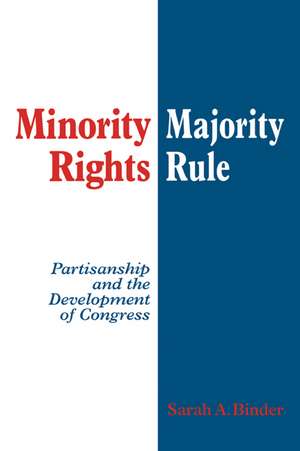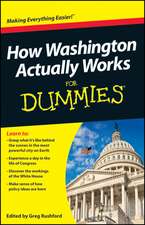Minority Rights, Majority Rule: Partisanship and the Development of Congress
Autor Sarah A. Binderen Limba Engleză Paperback – 12 iun 1997
| Toate formatele și edițiile | Preț | Express |
|---|---|---|
| Paperback (1) | 284.01 lei 6-8 săpt. | |
| Cambridge University Press – 12 iun 1997 | 284.01 lei 6-8 săpt. | |
| Hardback (1) | 682.42 lei 6-8 săpt. | |
| Cambridge University Press – 12 iun 1997 | 682.42 lei 6-8 săpt. |
Preț: 284.01 lei
Nou
Puncte Express: 426
Preț estimativ în valută:
54.35€ • 56.53$ • 44.87£
54.35€ • 56.53$ • 44.87£
Carte tipărită la comandă
Livrare economică 15-29 aprilie
Preluare comenzi: 021 569.72.76
Specificații
ISBN-13: 9780521587921
ISBN-10: 0521587921
Pagini: 256
Ilustrații: 15 b/w illus. 23 tables
Dimensiuni: 154 x 229 x 16 mm
Greutate: 0.36 kg
Editura: Cambridge University Press
Colecția Cambridge University Press
Locul publicării:New York, United States
ISBN-10: 0521587921
Pagini: 256
Ilustrații: 15 b/w illus. 23 tables
Dimensiuni: 154 x 229 x 16 mm
Greutate: 0.36 kg
Editura: Cambridge University Press
Colecția Cambridge University Press
Locul publicării:New York, United States
Cuprins
1. The partisan basis of procedural choice; 2. The evolving concepts of house and Senate minority rights; 3. Procedural choice in the early congress: the case of the Previous Question; 4. Allocating minority rights in the house, 1789–1990; 5. Institutionalizing party in the nineteenth century house; 6. Stacking the partisan decks in the twentieth century house; 7. Inherited rules and procedural choice in the Senate; 8. Assessing the partisan theory; Appendices; References.
Recenzii
"This is an extremely interesting book and one in which the author makes a convincing case for her various positions. It will I am sure, be accepted for a long time as an important contribution to the history of the U.S. Congress, to the study of American Congressional Politics, and to our understanding of institutionalization processes in the United States." Allen G. Bogue, H-Net Reviews
"Binder's use of history makes the development of minority party rights come alive." Alison D. Howard, LSS Newsletter
"In an age when partisan politics and congressional gridlock are under attack, Sarah A. Binder's stufy of procedural change in the House of Representatives and the Senate is most timely. Political historians will find this succinct, never overstated study valuable. Scrupulously documented, it is based on a thorough study of congressional sources such as the Congressional Globe and the Congressional Record, as well as works in political science." Donald B. Cole, The Journal of American History
"Binder's use of history makes the development of minority party rights come alive." Alison D. Howard, LSS Newsletter
"In an age when partisan politics and congressional gridlock are under attack, Sarah A. Binder's stufy of procedural change in the House of Representatives and the Senate is most timely. Political historians will find this succinct, never overstated study valuable. Scrupulously documented, it is based on a thorough study of congressional sources such as the Congressional Globe and the Congressional Record, as well as works in political science." Donald B. Cole, The Journal of American History
Descriere
Minority Rights, Majority Rules explains why majority parties dominate in the US House of Representatives, while minorities often dominate in the Senate.













